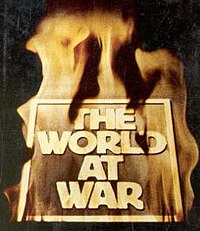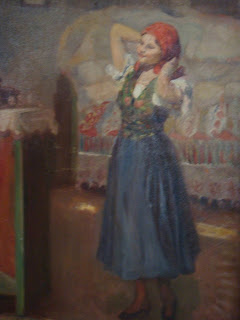 Just why Serbs, Croats, etc. don't dwell on the past is perhaps obvious. I think this was put most fittingly in the Thames Television Documentary Series The World at War as: Old men forget, particularly when it hurts to remember. With so much bad stuff lingering in the past, who wants to think about it, let alone tell some outsider all the gory details. For the curious, this can be rather disappointing or even irritating, but obviously one bites ones tougue.
Just why Serbs, Croats, etc. don't dwell on the past is perhaps obvious. I think this was put most fittingly in the Thames Television Documentary Series The World at War as: Old men forget, particularly when it hurts to remember. With so much bad stuff lingering in the past, who wants to think about it, let alone tell some outsider all the gory details. For the curious, this can be rather disappointing or even irritating, but obviously one bites ones tougue.Over the years, however, I've accumulated a lot of details about G's past, and particularly about her grandmother, that I hope will finally prompt me to sit down and get her to tell me everything. This will have to be done, I realise, by me, in my broken Serbian, perhaps coaxing the rest of the family to translate the hard parts. No matter how hard I try, G. doesn't really want to do it. And it will be difficult, since Baka has little patience for my Serbian - she's never left Yugoslavia, and often berates me for not speaking it better. Trebaš da uceš Robert - You need to learn. And as is so typical of people lacking a more worldly perspective, she shinks me quite the dunce for not speaking properly.
Despite having stayed in one country (that became six and soon probably seven) all her life, she has obviously had a fascinating, event-ridden life. I think most grandparents have a lot to tell, and I don't think mine were any exception, but there is something more in Baka - more than anything I've ever been directly exposed to. In Canada there is the occasional war death, and the odd farm tragedy, but we, of course, never had a revolution - at least not in living memory - whereas Baka lived through two. And life in Canada, on the whole, has been so darned good for people who either moved or grew-up there. Good stories always need a healthy dose of tragedy.
 What I know about Baka is sketchy. I know that she was born in the late 20s in Srem, a part of Vojvodina, and mostly brought up in a rural environment (her brother still lives on a farm today). Like everybody else, her life was turned upside down when the Nazi's invaded the region during the second world war. Her father was taken prinsoner - I think he was in the Army, but I'm not sure - and I know that he died in Germany. This is because G. explained to me why she was laughing at something Baka's brother was saying, one day a few years ago:
What I know about Baka is sketchy. I know that she was born in the late 20s in Srem, a part of Vojvodina, and mostly brought up in a rural environment (her brother still lives on a farm today). Like everybody else, her life was turned upside down when the Nazi's invaded the region during the second world war. Her father was taken prinsoner - I think he was in the Army, but I'm not sure - and I know that he died in Germany. This is because G. explained to me why she was laughing at something Baka's brother was saying, one day a few years ago:You know, I'm getting so old, I can't remember anything. For instance, I can't remember the name of the City where father died. I remembered that it had something to do with fast-food: Pizza, Burek or something, but I couldn't --- ah, Hamburger --- Hamburg! that's the place.
It was later revealed to me that he (that's G's great-grandfather) had died apparently after being subjected to human experimentation. Now I suspect a lot of people would tell a similar story about a relative, particularly if they were feeling angry about the Germans (or even wanting mildly to boast), but in this case it was apparently admitted by the German goverment in the 80s, but any attempt to extract money (these people aren't stupid afterall) failed, as I was later told.
I then know that Baka, at 15 or 16, joined the revolution, which basically meant that she marched in the 40s with most of the others of her generation with Tito and eventually helped free the country from the occupiers, not to mention presumably at least being near to nasty masacres that also happened at the time. Along the way, she ended up meeting her husband to be, who was one of Tito's Generals. G' remembers him as a very old man, which he must have been since he was 30 or more when he married his teenage bride.
After the war, and because of her husbands elevated status, they lived very well. Apparently the General had been quite the bourgeois before the war, but (likely to save his skin) had given all of his fortune & property to the state, only to be given it, and probably a lot more back as a member of the upper eschelons of the Communist Party. I don't know much more than this, but it is incredible to see the kinds of hand-me-downs that Baka has given G over the years. She has, for instance, an incredibly chic Parisian jacket, dating from the 50s, that must have cost a fortune, is still in mint condition, and which G. still wears, and which is always admired, to this day.
I know as well that her husband fell foul, as so many others did, of the Communist leaders, and was on the verge of imprisonment when Tito died, and he was thus able to salvage something of his reputation and manage a peaceful retirement.
Baka herself is a rather traditional Serbian woman. She believes in maintaining an antiseptically clean household, and holds the tradtional notion that no meal is worthy of eating unless it has been the product of at least six hours of toil, preferably involving at least two 4AM mornings (for instance to make stock or Ruski Salat from scratch). However, there are signs of her revolutionary youth. Until her health started to fail (she's nearly 80), she cycled everywhere, and always (at least to me) seemed to sport clothes more suited to a Communist than a little old lady. The image of her on the bike always conjured up images of plucky Chinese revolutionaries.
I'm dying to know more. What was her husband like? What did he do? Why did he fall foul of the party? Did she meet Tito? Where did that Jacket come from? Was life luxurious for them? What happened on her march after the war? And most of all: what does she think of what has happened to the country to this day?
I know that she didn't like the break-up of Yugoslavia. I think she rather had that old-persons incredulity about it all (e.g. This can't be happening). I know that during the Nato bombing of her city, when G's parents spent a lot of time in her fathers company's office in Budapest, that she shunned shelters preferring to hold fort in the family house, even scaring off some drunken Nationalist who thought that he should have the house instead of these traitors. I know, in essence, that this charming old lady - who likes a tidy kitchen, who watches hours of Latin soap operas, who doesn't give much away, and who (let's face facts) doesn't have long to live - has a great story to tell. I just hope that I can coax it out of her and then do justice to it before it is too late.


No comments:
Post a Comment